Leadership and Management of Services: A Comprehensive Report
VerifiedAdded on 2021/02/19
|15
|4552
|264
Report
AI Summary
This report provides a comprehensive analysis of leadership and management principles within the service industry, using the fictional Wa-pila Hotel as a case study. The report begins by exploring classical management theories, such as scientific, bureaucratic, and administrative management, and their application in a hospitality context. It examines the role of leaders and various leadership styles, including authoritarian and participative approaches, and reviews the specific management and leadership styles employed at Wa-pila. The report further investigates internal and external factors influencing management styles, such as company culture, employee diversity, customers, and competitors. It also highlights essential hard and soft skills required in the service sector, as well as future management and leadership skills. Finally, the report compares and contrasts different service industry change management systems and leadership approaches to implementing changes, concluding with a summary of key findings and their implications for effective leadership and management in the service industry.
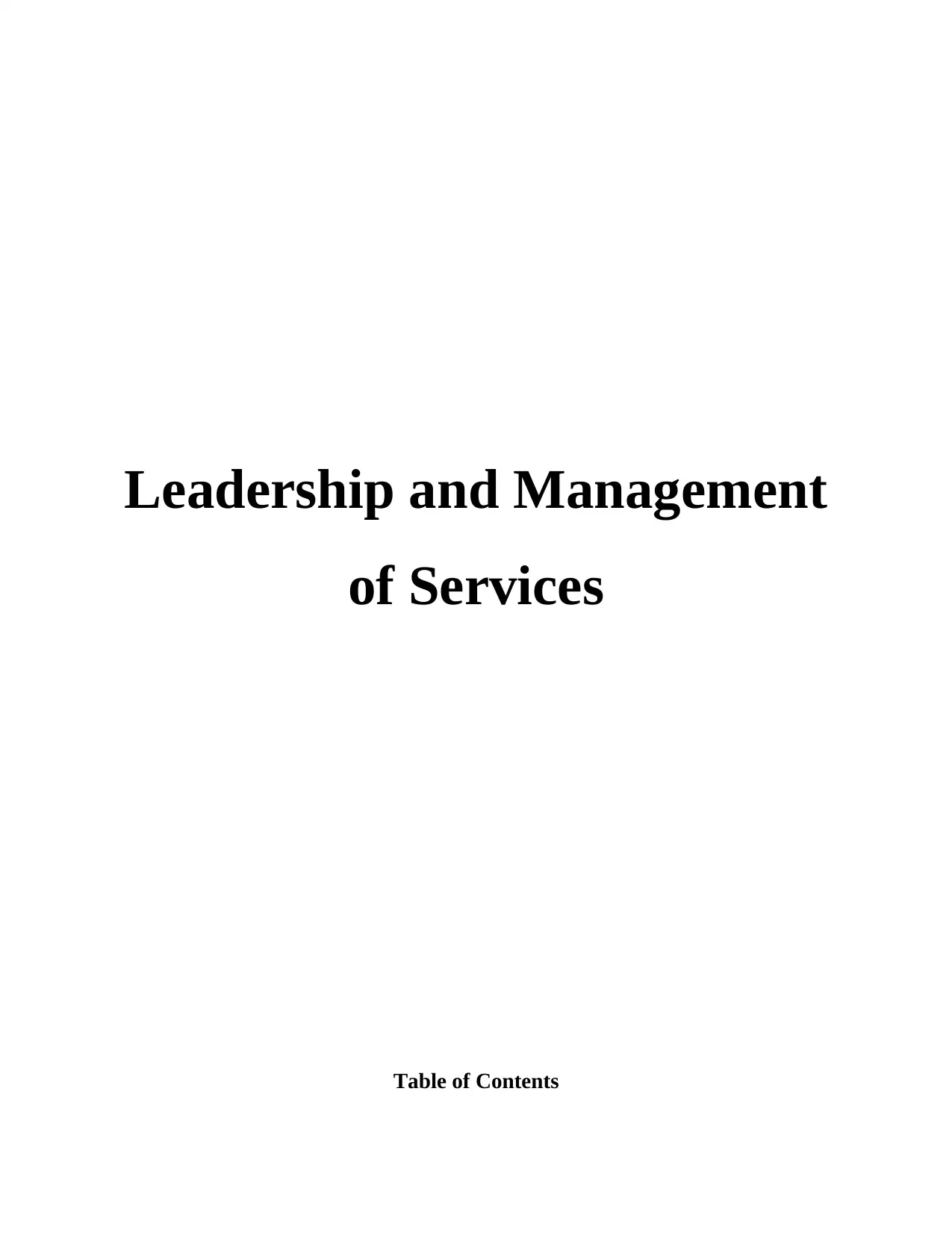
Leadership and Management
of Services
Table of Contents
of Services
Table of Contents
Paraphrase This Document
Need a fresh take? Get an instant paraphrase of this document with our AI Paraphraser
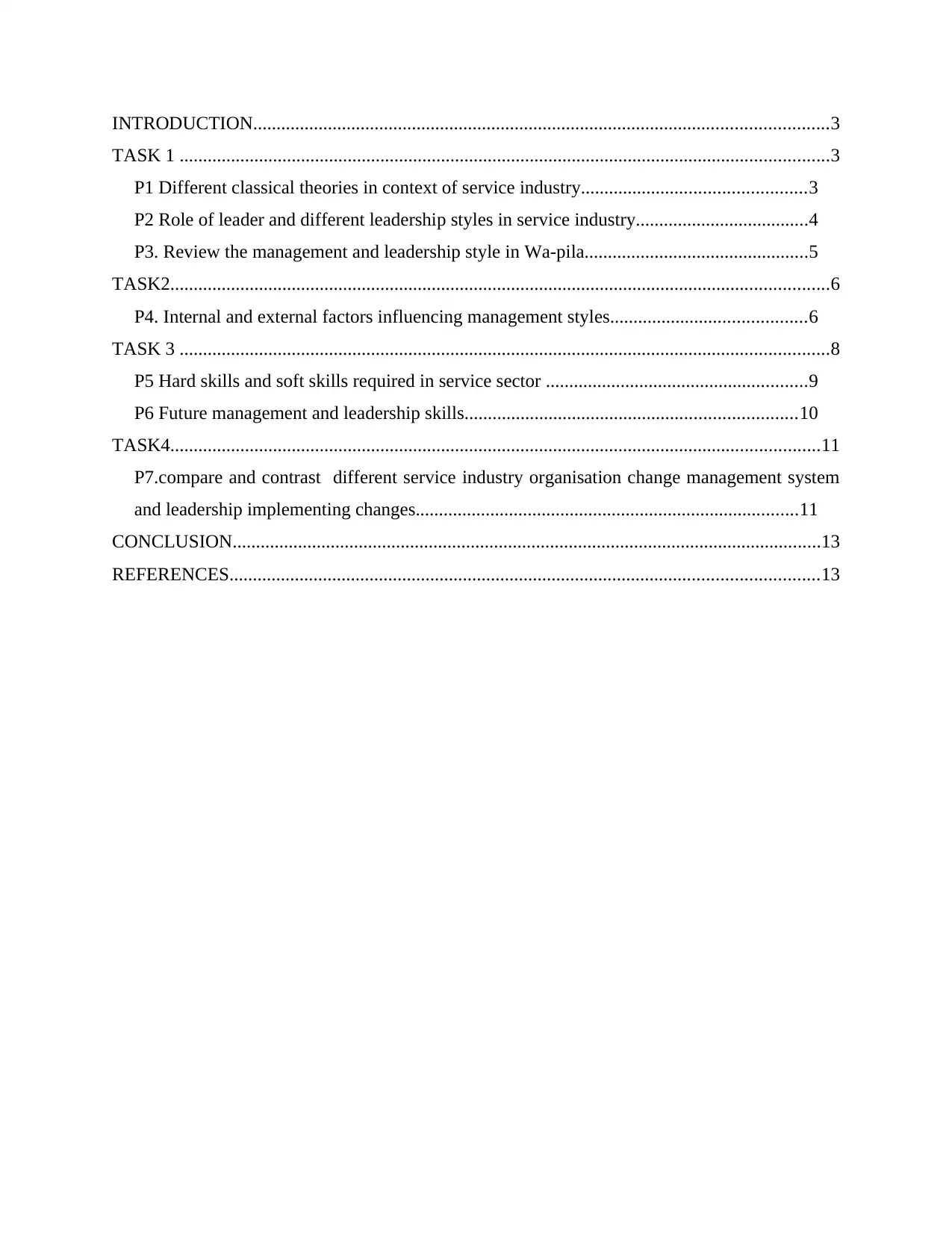
INTRODUCTION...........................................................................................................................3
TASK 1 ...........................................................................................................................................3
P1 Different classical theories in context of service industry................................................3
P2 Role of leader and different leadership styles in service industry.....................................4
P3. Review the management and leadership style in Wa-pila................................................5
TASK2.............................................................................................................................................6
P4. Internal and external factors influencing management styles..........................................6
TASK 3 ...........................................................................................................................................8
P5 Hard skills and soft skills required in service sector ........................................................9
P6 Future management and leadership skills.......................................................................10
TASK4...........................................................................................................................................11
P7.compare and contrast different service industry organisation change management system
and leadership implementing changes..................................................................................11
CONCLUSION..............................................................................................................................13
REFERENCES..............................................................................................................................13
TASK 1 ...........................................................................................................................................3
P1 Different classical theories in context of service industry................................................3
P2 Role of leader and different leadership styles in service industry.....................................4
P3. Review the management and leadership style in Wa-pila................................................5
TASK2.............................................................................................................................................6
P4. Internal and external factors influencing management styles..........................................6
TASK 3 ...........................................................................................................................................8
P5 Hard skills and soft skills required in service sector ........................................................9
P6 Future management and leadership skills.......................................................................10
TASK4...........................................................................................................................................11
P7.compare and contrast different service industry organisation change management system
and leadership implementing changes..................................................................................11
CONCLUSION..............................................................................................................................13
REFERENCES..............................................................................................................................13
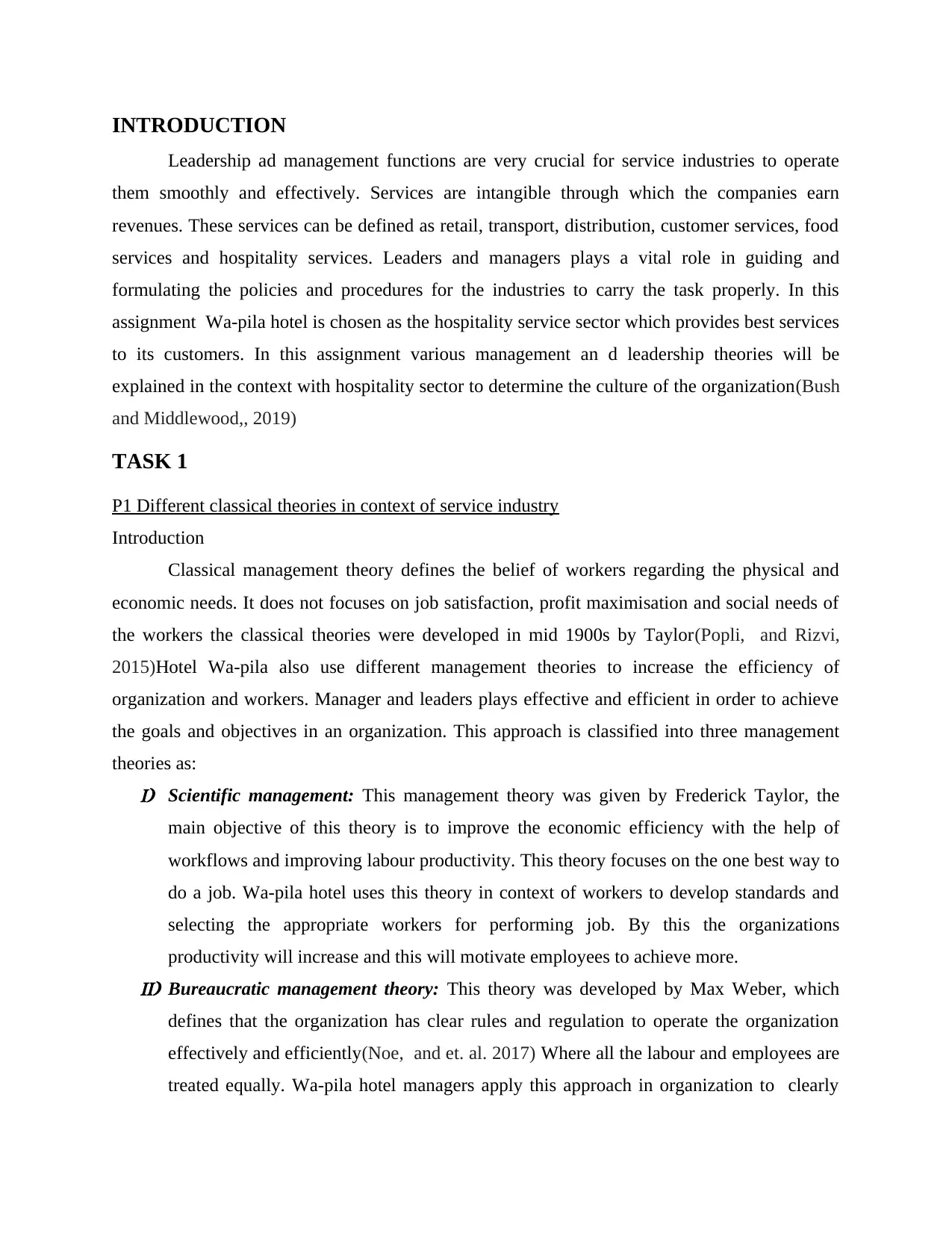
INTRODUCTION
Leadership ad management functions are very crucial for service industries to operate
them smoothly and effectively. Services are intangible through which the companies earn
revenues. These services can be defined as retail, transport, distribution, customer services, food
services and hospitality services. Leaders and managers plays a vital role in guiding and
formulating the policies and procedures for the industries to carry the task properly. In this
assignment Wa-pila hotel is chosen as the hospitality service sector which provides best services
to its customers. In this assignment various management an d leadership theories will be
explained in the context with hospitality sector to determine the culture of the organization(Bush
and Middlewood,, 2019)
TASK 1
P1 Different classical theories in context of service industry
Introduction
Classical management theory defines the belief of workers regarding the physical and
economic needs. It does not focuses on job satisfaction, profit maximisation and social needs of
the workers the classical theories were developed in mid 1900s by Taylor(Popli, and Rizvi,
2015)Hotel Wa-pila also use different management theories to increase the efficiency of
organization and workers. Manager and leaders plays effective and efficient in order to achieve
the goals and objectives in an organization. This approach is classified into three management
theories as:I) Scientific management: This management theory was given by Frederick Taylor, the
main objective of this theory is to improve the economic efficiency with the help of
workflows and improving labour productivity. This theory focuses on the one best way to
do a job. Wa-pila hotel uses this theory in context of workers to develop standards and
selecting the appropriate workers for performing job. By this the organizations
productivity will increase and this will motivate employees to achieve more.II) Bureaucratic management theory: This theory was developed by Max Weber, which
defines that the organization has clear rules and regulation to operate the organization
effectively and efficiently(Noe, and et. al. 2017) Where all the labour and employees are
treated equally. Wa-pila hotel managers apply this approach in organization to clearly
Leadership ad management functions are very crucial for service industries to operate
them smoothly and effectively. Services are intangible through which the companies earn
revenues. These services can be defined as retail, transport, distribution, customer services, food
services and hospitality services. Leaders and managers plays a vital role in guiding and
formulating the policies and procedures for the industries to carry the task properly. In this
assignment Wa-pila hotel is chosen as the hospitality service sector which provides best services
to its customers. In this assignment various management an d leadership theories will be
explained in the context with hospitality sector to determine the culture of the organization(Bush
and Middlewood,, 2019)
TASK 1
P1 Different classical theories in context of service industry
Introduction
Classical management theory defines the belief of workers regarding the physical and
economic needs. It does not focuses on job satisfaction, profit maximisation and social needs of
the workers the classical theories were developed in mid 1900s by Taylor(Popli, and Rizvi,
2015)Hotel Wa-pila also use different management theories to increase the efficiency of
organization and workers. Manager and leaders plays effective and efficient in order to achieve
the goals and objectives in an organization. This approach is classified into three management
theories as:I) Scientific management: This management theory was given by Frederick Taylor, the
main objective of this theory is to improve the economic efficiency with the help of
workflows and improving labour productivity. This theory focuses on the one best way to
do a job. Wa-pila hotel uses this theory in context of workers to develop standards and
selecting the appropriate workers for performing job. By this the organizations
productivity will increase and this will motivate employees to achieve more.II) Bureaucratic management theory: This theory was developed by Max Weber, which
defines that the organization has clear rules and regulation to operate the organization
effectively and efficiently(Noe, and et. al. 2017) Where all the labour and employees are
treated equally. Wa-pila hotel managers apply this approach in organization to clearly
⊘ This is a preview!⊘
Do you want full access?
Subscribe today to unlock all pages.

Trusted by 1+ million students worldwide
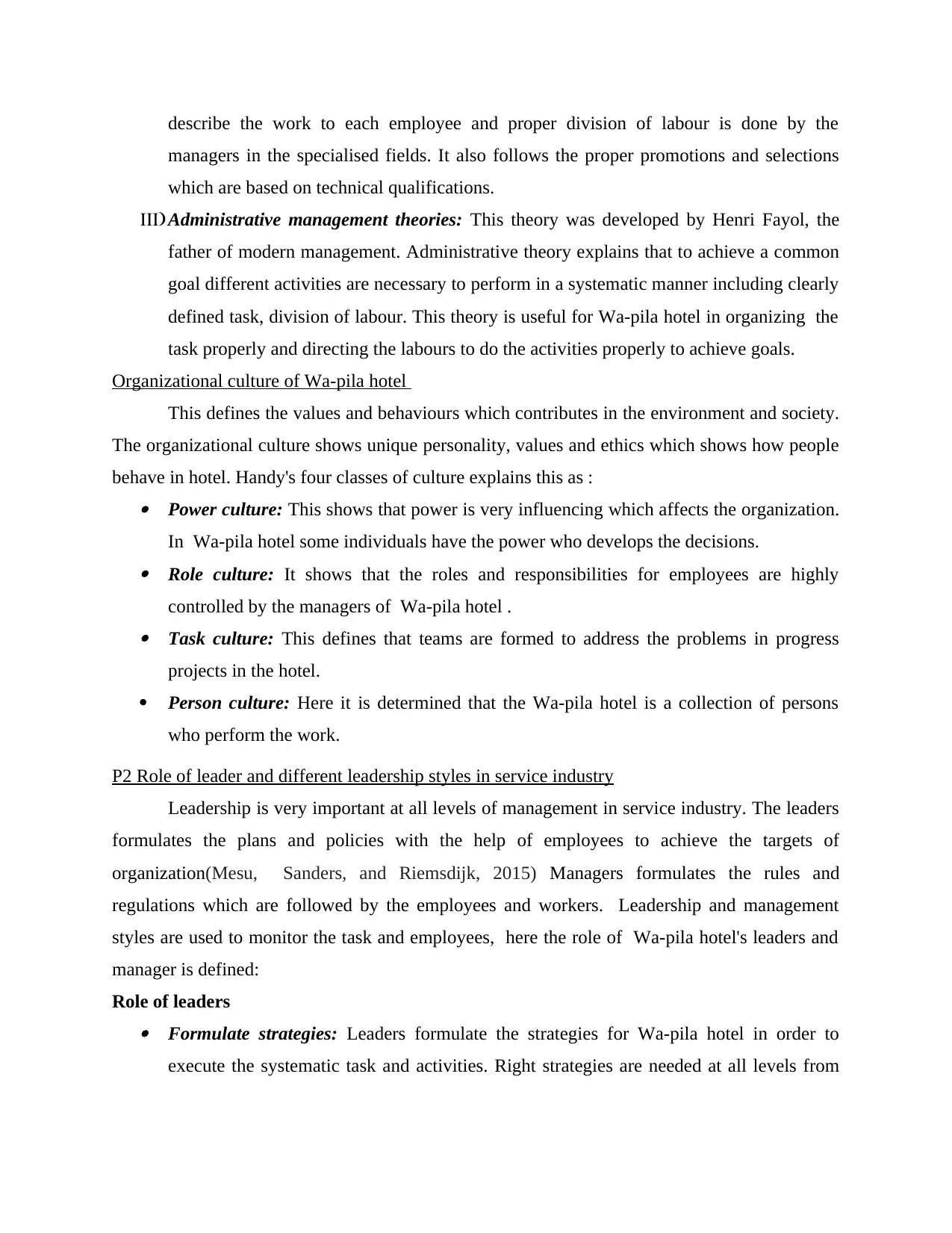
describe the work to each employee and proper division of labour is done by the
managers in the specialised fields. It also follows the proper promotions and selections
which are based on technical qualifications.
III) Administrative management theories: This theory was developed by Henri Fayol, the
father of modern management. Administrative theory explains that to achieve a common
goal different activities are necessary to perform in a systematic manner including clearly
defined task, division of labour. This theory is useful for Wa-pila hotel in organizing the
task properly and directing the labours to do the activities properly to achieve goals.
Organizational culture of Wa-pila hotel
This defines the values and behaviours which contributes in the environment and society.
The organizational culture shows unique personality, values and ethics which shows how people
behave in hotel. Handy's four classes of culture explains this as : Power culture: This shows that power is very influencing which affects the organization.
In Wa-pila hotel some individuals have the power who develops the decisions. Role culture: It shows that the roles and responsibilities for employees are highly
controlled by the managers of Wa-pila hotel . Task culture: This defines that teams are formed to address the problems in progress
projects in the hotel.
Person culture: Here it is determined that the Wa-pila hotel is a collection of persons
who perform the work.
P2 Role of leader and different leadership styles in service industry
Leadership is very important at all levels of management in service industry. The leaders
formulates the plans and policies with the help of employees to achieve the targets of
organization(Mesu, Sanders, and Riemsdijk, 2015) Managers formulates the rules and
regulations which are followed by the employees and workers. Leadership and management
styles are used to monitor the task and employees, here the role of Wa-pila hotel's leaders and
manager is defined:
Role of leaders Formulate strategies: Leaders formulate the strategies for Wa-pila hotel in order to
execute the systematic task and activities. Right strategies are needed at all levels from
managers in the specialised fields. It also follows the proper promotions and selections
which are based on technical qualifications.
III) Administrative management theories: This theory was developed by Henri Fayol, the
father of modern management. Administrative theory explains that to achieve a common
goal different activities are necessary to perform in a systematic manner including clearly
defined task, division of labour. This theory is useful for Wa-pila hotel in organizing the
task properly and directing the labours to do the activities properly to achieve goals.
Organizational culture of Wa-pila hotel
This defines the values and behaviours which contributes in the environment and society.
The organizational culture shows unique personality, values and ethics which shows how people
behave in hotel. Handy's four classes of culture explains this as : Power culture: This shows that power is very influencing which affects the organization.
In Wa-pila hotel some individuals have the power who develops the decisions. Role culture: It shows that the roles and responsibilities for employees are highly
controlled by the managers of Wa-pila hotel . Task culture: This defines that teams are formed to address the problems in progress
projects in the hotel.
Person culture: Here it is determined that the Wa-pila hotel is a collection of persons
who perform the work.
P2 Role of leader and different leadership styles in service industry
Leadership is very important at all levels of management in service industry. The leaders
formulates the plans and policies with the help of employees to achieve the targets of
organization(Mesu, Sanders, and Riemsdijk, 2015) Managers formulates the rules and
regulations which are followed by the employees and workers. Leadership and management
styles are used to monitor the task and employees, here the role of Wa-pila hotel's leaders and
manager is defined:
Role of leaders Formulate strategies: Leaders formulate the strategies for Wa-pila hotel in order to
execute the systematic task and activities. Right strategies are needed at all levels from
Paraphrase This Document
Need a fresh take? Get an instant paraphrase of this document with our AI Paraphraser
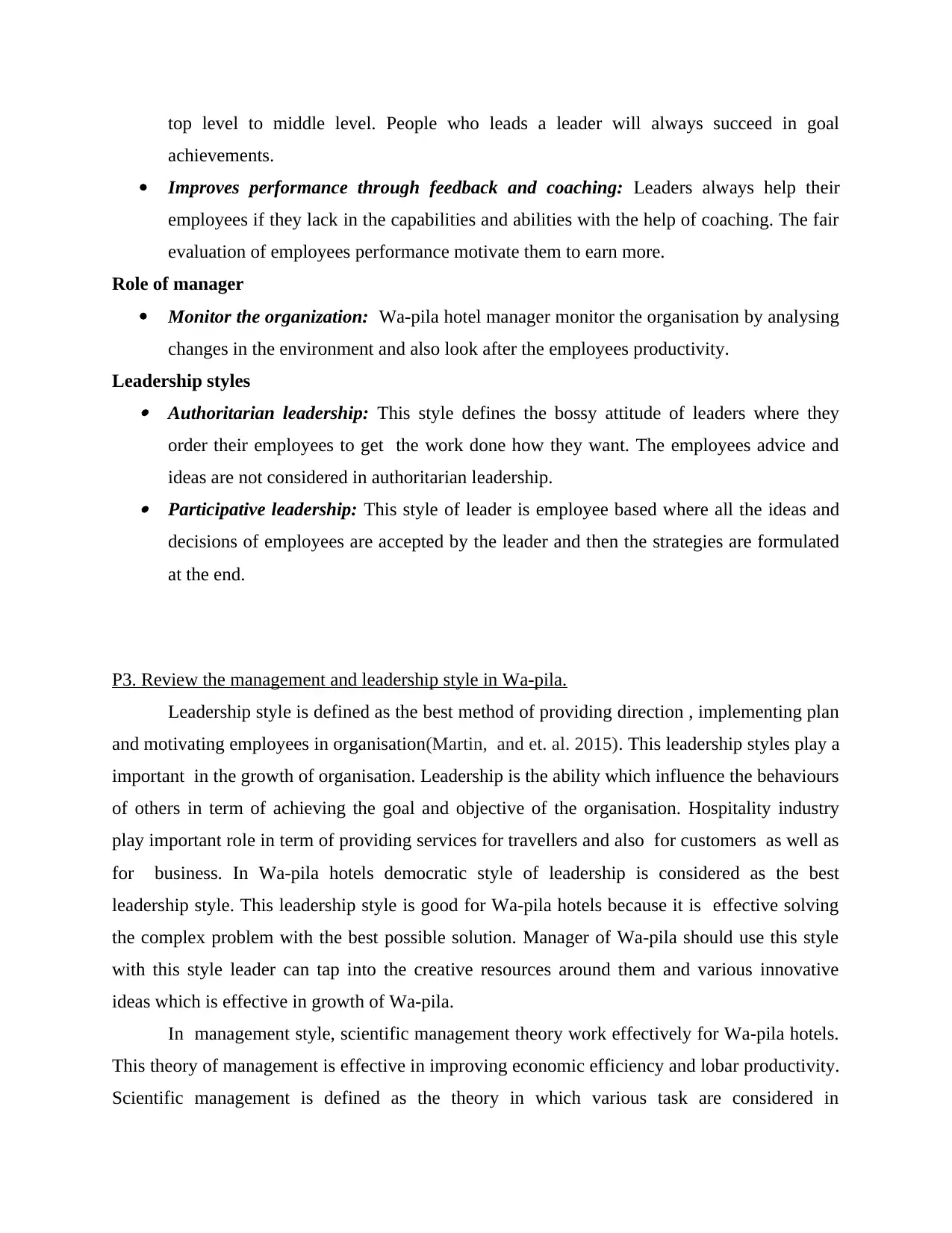
top level to middle level. People who leads a leader will always succeed in goal
achievements.
Improves performance through feedback and coaching: Leaders always help their
employees if they lack in the capabilities and abilities with the help of coaching. The fair
evaluation of employees performance motivate them to earn more.
Role of manager
Monitor the organization: Wa-pila hotel manager monitor the organisation by analysing
changes in the environment and also look after the employees productivity.
Leadership styles Authoritarian leadership: This style defines the bossy attitude of leaders where they
order their employees to get the work done how they want. The employees advice and
ideas are not considered in authoritarian leadership. Participative leadership: This style of leader is employee based where all the ideas and
decisions of employees are accepted by the leader and then the strategies are formulated
at the end.
P3. Review the management and leadership style in Wa-pila.
Leadership style is defined as the best method of providing direction , implementing plan
and motivating employees in organisation(Martin, and et. al. 2015). This leadership styles play a
important in the growth of organisation. Leadership is the ability which influence the behaviours
of others in term of achieving the goal and objective of the organisation. Hospitality industry
play important role in term of providing services for travellers and also for customers as well as
for business. In Wa-pila hotels democratic style of leadership is considered as the best
leadership style. This leadership style is good for Wa-pila hotels because it is effective solving
the complex problem with the best possible solution. Manager of Wa-pila should use this style
with this style leader can tap into the creative resources around them and various innovative
ideas which is effective in growth of Wa-pila.
In management style, scientific management theory work effectively for Wa-pila hotels.
This theory of management is effective in improving economic efficiency and lobar productivity.
Scientific management is defined as the theory in which various task are considered in
achievements.
Improves performance through feedback and coaching: Leaders always help their
employees if they lack in the capabilities and abilities with the help of coaching. The fair
evaluation of employees performance motivate them to earn more.
Role of manager
Monitor the organization: Wa-pila hotel manager monitor the organisation by analysing
changes in the environment and also look after the employees productivity.
Leadership styles Authoritarian leadership: This style defines the bossy attitude of leaders where they
order their employees to get the work done how they want. The employees advice and
ideas are not considered in authoritarian leadership. Participative leadership: This style of leader is employee based where all the ideas and
decisions of employees are accepted by the leader and then the strategies are formulated
at the end.
P3. Review the management and leadership style in Wa-pila.
Leadership style is defined as the best method of providing direction , implementing plan
and motivating employees in organisation(Martin, and et. al. 2015). This leadership styles play a
important in the growth of organisation. Leadership is the ability which influence the behaviours
of others in term of achieving the goal and objective of the organisation. Hospitality industry
play important role in term of providing services for travellers and also for customers as well as
for business. In Wa-pila hotels democratic style of leadership is considered as the best
leadership style. This leadership style is good for Wa-pila hotels because it is effective solving
the complex problem with the best possible solution. Manager of Wa-pila should use this style
with this style leader can tap into the creative resources around them and various innovative
ideas which is effective in growth of Wa-pila.
In management style, scientific management theory work effectively for Wa-pila hotels.
This theory of management is effective in improving economic efficiency and lobar productivity.
Scientific management is defined as the theory in which various task are considered in
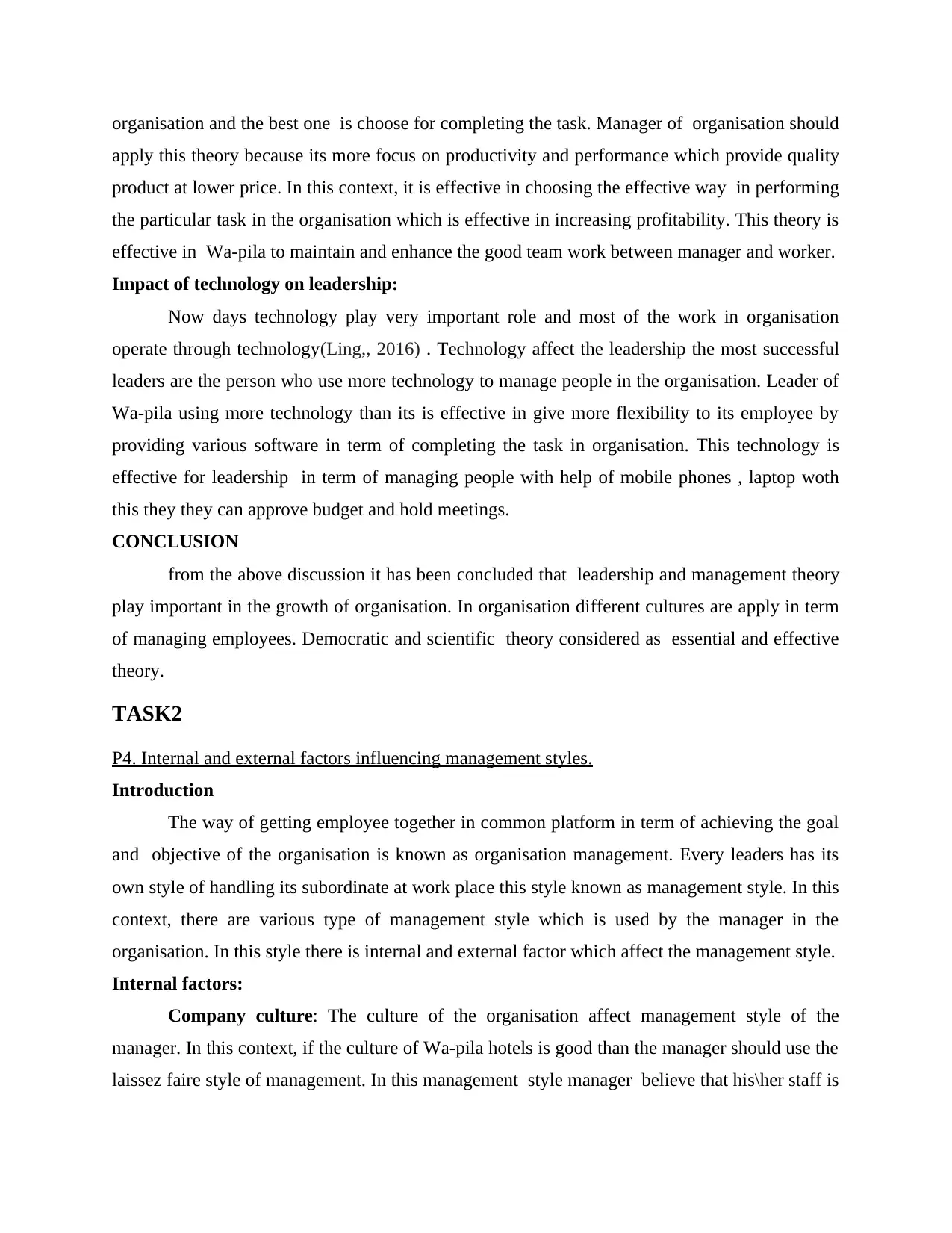
organisation and the best one is choose for completing the task. Manager of organisation should
apply this theory because its more focus on productivity and performance which provide quality
product at lower price. In this context, it is effective in choosing the effective way in performing
the particular task in the organisation which is effective in increasing profitability. This theory is
effective in Wa-pila to maintain and enhance the good team work between manager and worker.
Impact of technology on leadership:
Now days technology play very important role and most of the work in organisation
operate through technology(Ling,, 2016) . Technology affect the leadership the most successful
leaders are the person who use more technology to manage people in the organisation. Leader of
Wa-pila using more technology than its is effective in give more flexibility to its employee by
providing various software in term of completing the task in organisation. This technology is
effective for leadership in term of managing people with help of mobile phones , laptop woth
this they they can approve budget and hold meetings.
CONCLUSION
from the above discussion it has been concluded that leadership and management theory
play important in the growth of organisation. In organisation different cultures are apply in term
of managing employees. Democratic and scientific theory considered as essential and effective
theory.
TASK2
P4. Internal and external factors influencing management styles.
Introduction
The way of getting employee together in common platform in term of achieving the goal
and objective of the organisation is known as organisation management. Every leaders has its
own style of handling its subordinate at work place this style known as management style. In this
context, there are various type of management style which is used by the manager in the
organisation. In this style there is internal and external factor which affect the management style.
Internal factors:
Company culture: The culture of the organisation affect management style of the
manager. In this context, if the culture of Wa-pila hotels is good than the manager should use the
laissez faire style of management. In this management style manager believe that his\her staff is
apply this theory because its more focus on productivity and performance which provide quality
product at lower price. In this context, it is effective in choosing the effective way in performing
the particular task in the organisation which is effective in increasing profitability. This theory is
effective in Wa-pila to maintain and enhance the good team work between manager and worker.
Impact of technology on leadership:
Now days technology play very important role and most of the work in organisation
operate through technology(Ling,, 2016) . Technology affect the leadership the most successful
leaders are the person who use more technology to manage people in the organisation. Leader of
Wa-pila using more technology than its is effective in give more flexibility to its employee by
providing various software in term of completing the task in organisation. This technology is
effective for leadership in term of managing people with help of mobile phones , laptop woth
this they they can approve budget and hold meetings.
CONCLUSION
from the above discussion it has been concluded that leadership and management theory
play important in the growth of organisation. In organisation different cultures are apply in term
of managing employees. Democratic and scientific theory considered as essential and effective
theory.
TASK2
P4. Internal and external factors influencing management styles.
Introduction
The way of getting employee together in common platform in term of achieving the goal
and objective of the organisation is known as organisation management. Every leaders has its
own style of handling its subordinate at work place this style known as management style. In this
context, there are various type of management style which is used by the manager in the
organisation. In this style there is internal and external factor which affect the management style.
Internal factors:
Company culture: The culture of the organisation affect management style of the
manager. In this context, if the culture of Wa-pila hotels is good than the manager should use the
laissez faire style of management. In this management style manager believe that his\her staff is
⊘ This is a preview!⊘
Do you want full access?
Subscribe today to unlock all pages.

Trusted by 1+ million students worldwide
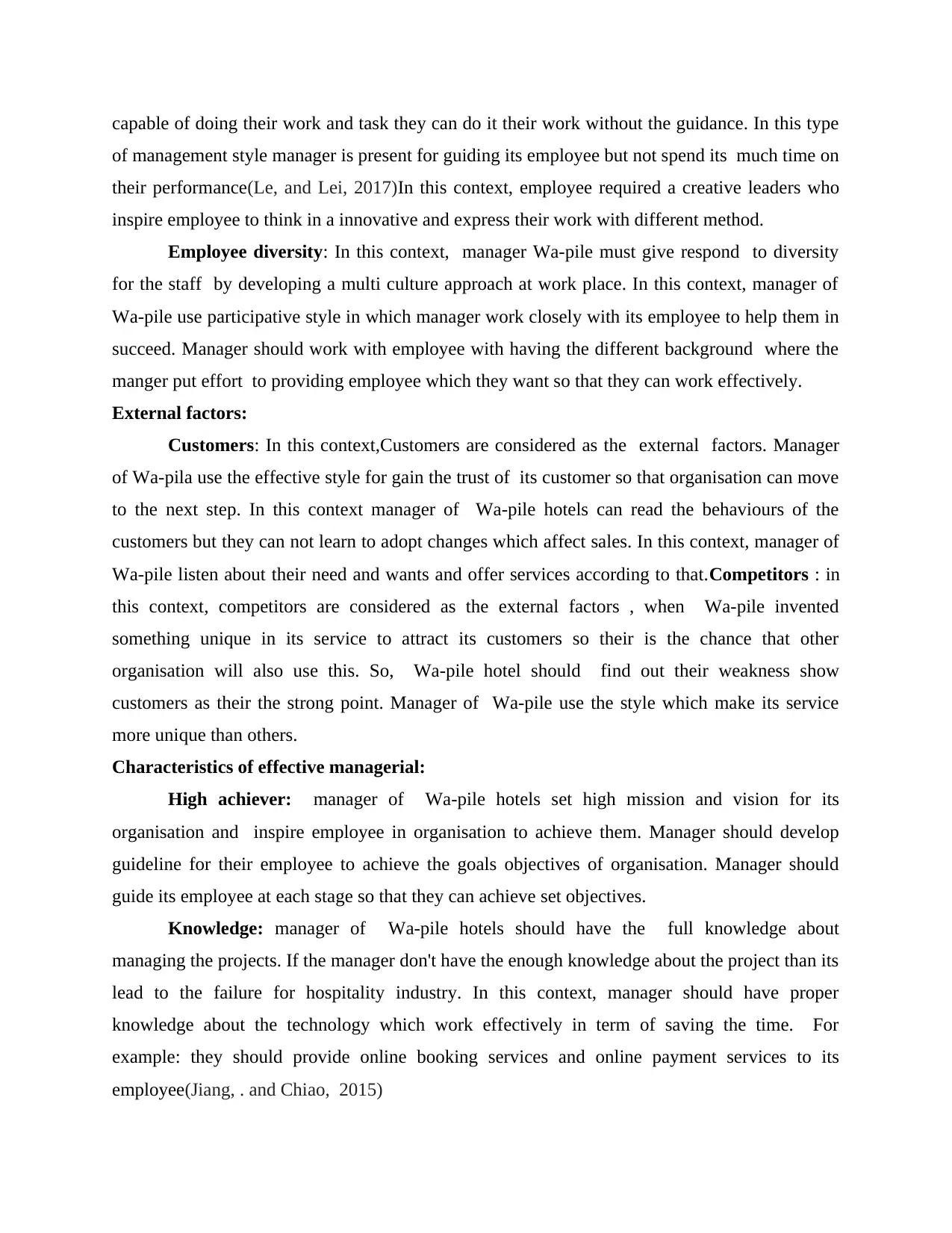
capable of doing their work and task they can do it their work without the guidance. In this type
of management style manager is present for guiding its employee but not spend its much time on
their performance(Le, and Lei, 2017)In this context, employee required a creative leaders who
inspire employee to think in a innovative and express their work with different method.
Employee diversity: In this context, manager Wa-pile must give respond to diversity
for the staff by developing a multi culture approach at work place. In this context, manager of
Wa-pile use participative style in which manager work closely with its employee to help them in
succeed. Manager should work with employee with having the different background where the
manger put effort to providing employee which they want so that they can work effectively.
External factors:
Customers: In this context,Customers are considered as the external factors. Manager
of Wa-pila use the effective style for gain the trust of its customer so that organisation can move
to the next step. In this context manager of Wa-pile hotels can read the behaviours of the
customers but they can not learn to adopt changes which affect sales. In this context, manager of
Wa-pile listen about their need and wants and offer services according to that.Competitors : in
this context, competitors are considered as the external factors , when Wa-pile invented
something unique in its service to attract its customers so their is the chance that other
organisation will also use this. So, Wa-pile hotel should find out their weakness show
customers as their the strong point. Manager of Wa-pile use the style which make its service
more unique than others.
Characteristics of effective managerial:
High achiever: manager of Wa-pile hotels set high mission and vision for its
organisation and inspire employee in organisation to achieve them. Manager should develop
guideline for their employee to achieve the goals objectives of organisation. Manager should
guide its employee at each stage so that they can achieve set objectives.
Knowledge: manager of Wa-pile hotels should have the full knowledge about
managing the projects. If the manager don't have the enough knowledge about the project than its
lead to the failure for hospitality industry. In this context, manager should have proper
knowledge about the technology which work effectively in term of saving the time. For
example: they should provide online booking services and online payment services to its
employee(Jiang, . and Chiao, 2015)
of management style manager is present for guiding its employee but not spend its much time on
their performance(Le, and Lei, 2017)In this context, employee required a creative leaders who
inspire employee to think in a innovative and express their work with different method.
Employee diversity: In this context, manager Wa-pile must give respond to diversity
for the staff by developing a multi culture approach at work place. In this context, manager of
Wa-pile use participative style in which manager work closely with its employee to help them in
succeed. Manager should work with employee with having the different background where the
manger put effort to providing employee which they want so that they can work effectively.
External factors:
Customers: In this context,Customers are considered as the external factors. Manager
of Wa-pila use the effective style for gain the trust of its customer so that organisation can move
to the next step. In this context manager of Wa-pile hotels can read the behaviours of the
customers but they can not learn to adopt changes which affect sales. In this context, manager of
Wa-pile listen about their need and wants and offer services according to that.Competitors : in
this context, competitors are considered as the external factors , when Wa-pile invented
something unique in its service to attract its customers so their is the chance that other
organisation will also use this. So, Wa-pile hotel should find out their weakness show
customers as their the strong point. Manager of Wa-pile use the style which make its service
more unique than others.
Characteristics of effective managerial:
High achiever: manager of Wa-pile hotels set high mission and vision for its
organisation and inspire employee in organisation to achieve them. Manager should develop
guideline for their employee to achieve the goals objectives of organisation. Manager should
guide its employee at each stage so that they can achieve set objectives.
Knowledge: manager of Wa-pile hotels should have the full knowledge about
managing the projects. If the manager don't have the enough knowledge about the project than its
lead to the failure for hospitality industry. In this context, manager should have proper
knowledge about the technology which work effectively in term of saving the time. For
example: they should provide online booking services and online payment services to its
employee(Jiang, . and Chiao, 2015)
Paraphrase This Document
Need a fresh take? Get an instant paraphrase of this document with our AI Paraphraser
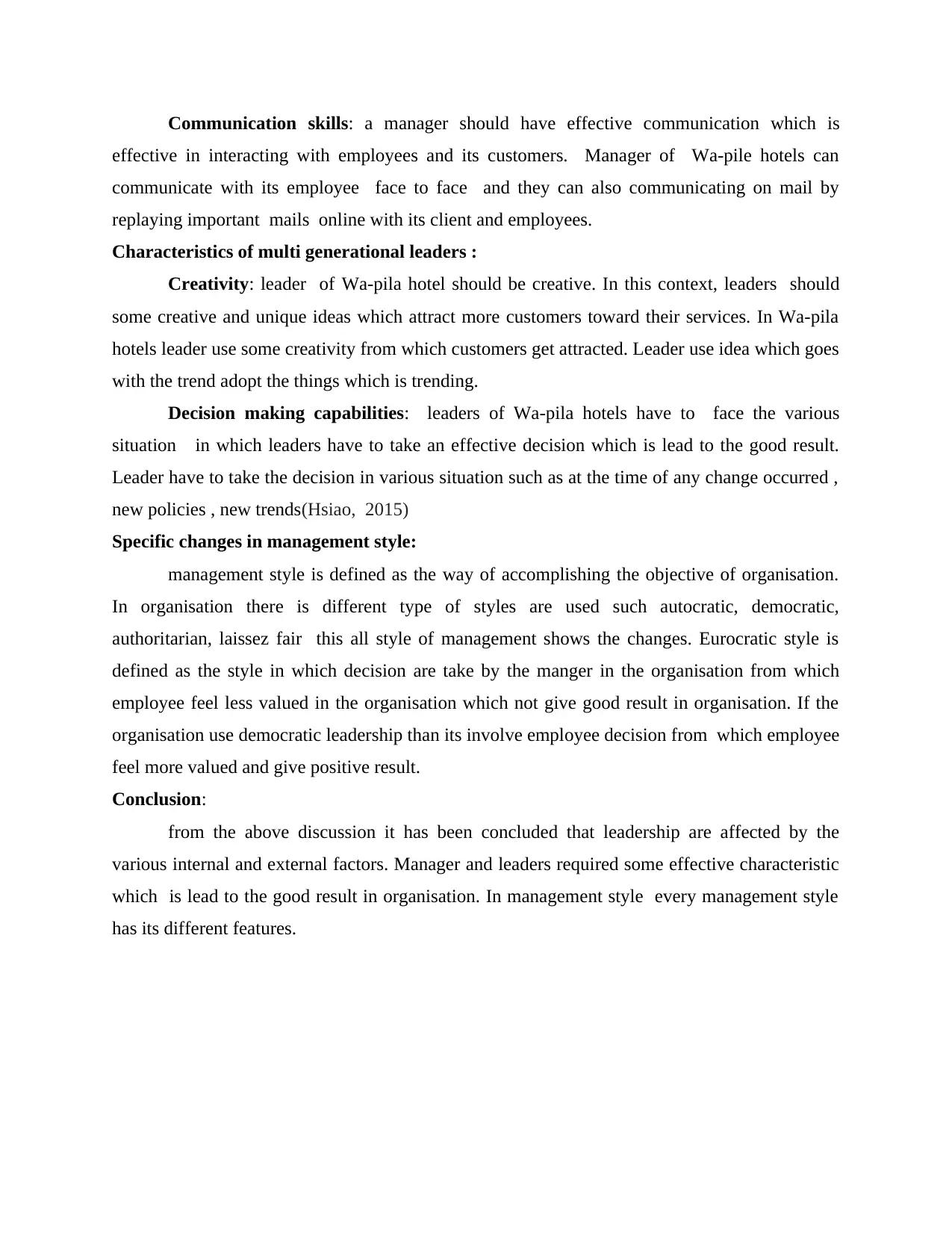
Communication skills: a manager should have effective communication which is
effective in interacting with employees and its customers. Manager of Wa-pile hotels can
communicate with its employee face to face and they can also communicating on mail by
replaying important mails online with its client and employees.
Characteristics of multi generational leaders :
Creativity: leader of Wa-pila hotel should be creative. In this context, leaders should
some creative and unique ideas which attract more customers toward their services. In Wa-pila
hotels leader use some creativity from which customers get attracted. Leader use idea which goes
with the trend adopt the things which is trending.
Decision making capabilities: leaders of Wa-pila hotels have to face the various
situation in which leaders have to take an effective decision which is lead to the good result.
Leader have to take the decision in various situation such as at the time of any change occurred ,
new policies , new trends(Hsiao, 2015)
Specific changes in management style:
management style is defined as the way of accomplishing the objective of organisation.
In organisation there is different type of styles are used such autocratic, democratic,
authoritarian, laissez fair this all style of management shows the changes. Eurocratic style is
defined as the style in which decision are take by the manger in the organisation from which
employee feel less valued in the organisation which not give good result in organisation. If the
organisation use democratic leadership than its involve employee decision from which employee
feel more valued and give positive result.
Conclusion:
from the above discussion it has been concluded that leadership are affected by the
various internal and external factors. Manager and leaders required some effective characteristic
which is lead to the good result in organisation. In management style every management style
has its different features.
effective in interacting with employees and its customers. Manager of Wa-pile hotels can
communicate with its employee face to face and they can also communicating on mail by
replaying important mails online with its client and employees.
Characteristics of multi generational leaders :
Creativity: leader of Wa-pila hotel should be creative. In this context, leaders should
some creative and unique ideas which attract more customers toward their services. In Wa-pila
hotels leader use some creativity from which customers get attracted. Leader use idea which goes
with the trend adopt the things which is trending.
Decision making capabilities: leaders of Wa-pila hotels have to face the various
situation in which leaders have to take an effective decision which is lead to the good result.
Leader have to take the decision in various situation such as at the time of any change occurred ,
new policies , new trends(Hsiao, 2015)
Specific changes in management style:
management style is defined as the way of accomplishing the objective of organisation.
In organisation there is different type of styles are used such autocratic, democratic,
authoritarian, laissez fair this all style of management shows the changes. Eurocratic style is
defined as the style in which decision are take by the manger in the organisation from which
employee feel less valued in the organisation which not give good result in organisation. If the
organisation use democratic leadership than its involve employee decision from which employee
feel more valued and give positive result.
Conclusion:
from the above discussion it has been concluded that leadership are affected by the
various internal and external factors. Manager and leaders required some effective characteristic
which is lead to the good result in organisation. In management style every management style
has its different features.
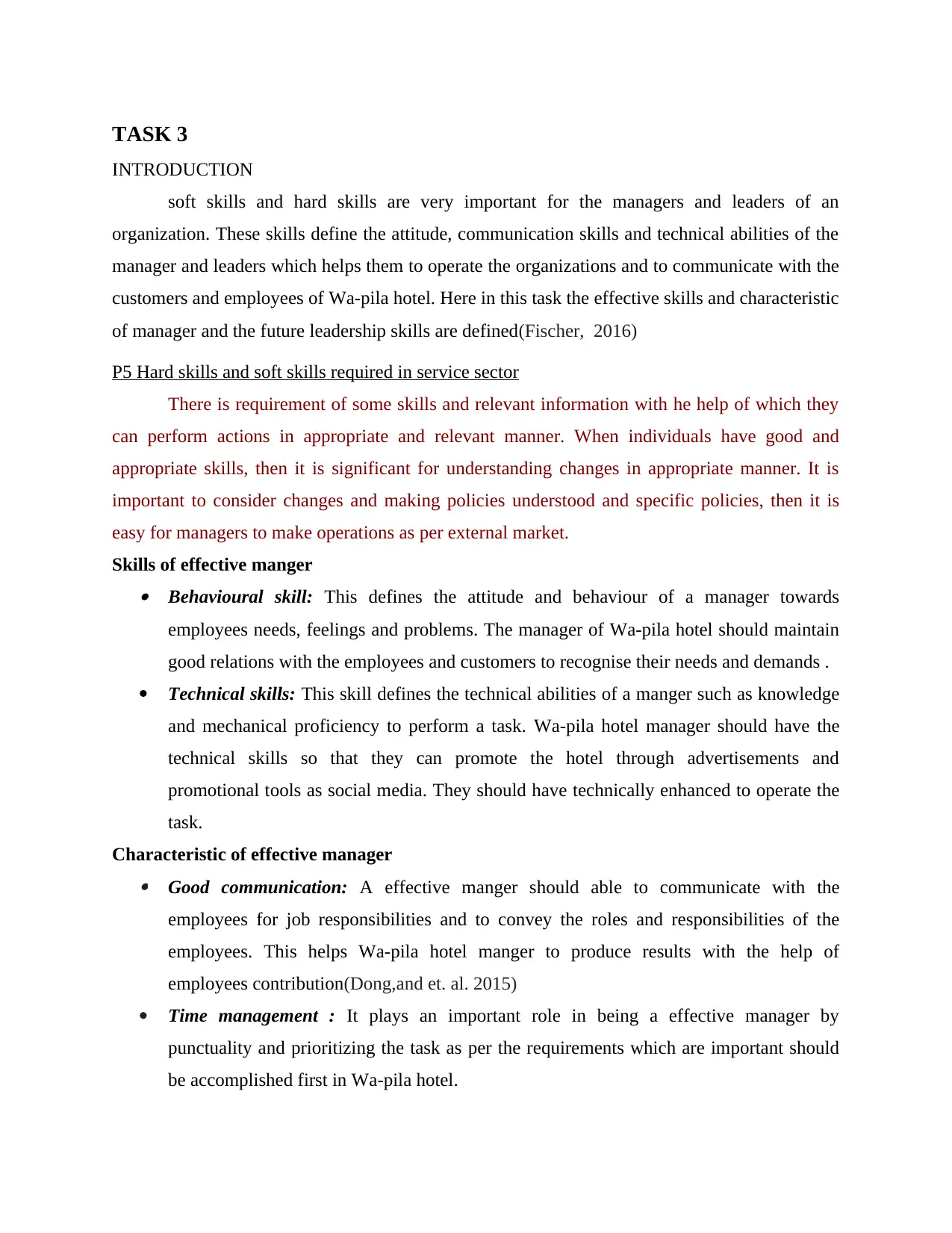
TASK 3
INTRODUCTION
soft skills and hard skills are very important for the managers and leaders of an
organization. These skills define the attitude, communication skills and technical abilities of the
manager and leaders which helps them to operate the organizations and to communicate with the
customers and employees of Wa-pila hotel. Here in this task the effective skills and characteristic
of manager and the future leadership skills are defined(Fischer, 2016)
P5 Hard skills and soft skills required in service sector
There is requirement of some skills and relevant information with he help of which they
can perform actions in appropriate and relevant manner. When individuals have good and
appropriate skills, then it is significant for understanding changes in appropriate manner. It is
important to consider changes and making policies understood and specific policies, then it is
easy for managers to make operations as per external market.
Skills of effective manger Behavioural skill: This defines the attitude and behaviour of a manager towards
employees needs, feelings and problems. The manager of Wa-pila hotel should maintain
good relations with the employees and customers to recognise their needs and demands .
Technical skills: This skill defines the technical abilities of a manger such as knowledge
and mechanical proficiency to perform a task. Wa-pila hotel manager should have the
technical skills so that they can promote the hotel through advertisements and
promotional tools as social media. They should have technically enhanced to operate the
task.
Characteristic of effective manager Good communication: A effective manger should able to communicate with the
employees for job responsibilities and to convey the roles and responsibilities of the
employees. This helps Wa-pila hotel manger to produce results with the help of
employees contribution(Dong,and et. al. 2015)
Time management : It plays an important role in being a effective manager by
punctuality and prioritizing the task as per the requirements which are important should
be accomplished first in Wa-pila hotel.
INTRODUCTION
soft skills and hard skills are very important for the managers and leaders of an
organization. These skills define the attitude, communication skills and technical abilities of the
manager and leaders which helps them to operate the organizations and to communicate with the
customers and employees of Wa-pila hotel. Here in this task the effective skills and characteristic
of manager and the future leadership skills are defined(Fischer, 2016)
P5 Hard skills and soft skills required in service sector
There is requirement of some skills and relevant information with he help of which they
can perform actions in appropriate and relevant manner. When individuals have good and
appropriate skills, then it is significant for understanding changes in appropriate manner. It is
important to consider changes and making policies understood and specific policies, then it is
easy for managers to make operations as per external market.
Skills of effective manger Behavioural skill: This defines the attitude and behaviour of a manager towards
employees needs, feelings and problems. The manager of Wa-pila hotel should maintain
good relations with the employees and customers to recognise their needs and demands .
Technical skills: This skill defines the technical abilities of a manger such as knowledge
and mechanical proficiency to perform a task. Wa-pila hotel manager should have the
technical skills so that they can promote the hotel through advertisements and
promotional tools as social media. They should have technically enhanced to operate the
task.
Characteristic of effective manager Good communication: A effective manger should able to communicate with the
employees for job responsibilities and to convey the roles and responsibilities of the
employees. This helps Wa-pila hotel manger to produce results with the help of
employees contribution(Dong,and et. al. 2015)
Time management : It plays an important role in being a effective manager by
punctuality and prioritizing the task as per the requirements which are important should
be accomplished first in Wa-pila hotel.
⊘ This is a preview!⊘
Do you want full access?
Subscribe today to unlock all pages.

Trusted by 1+ million students worldwide
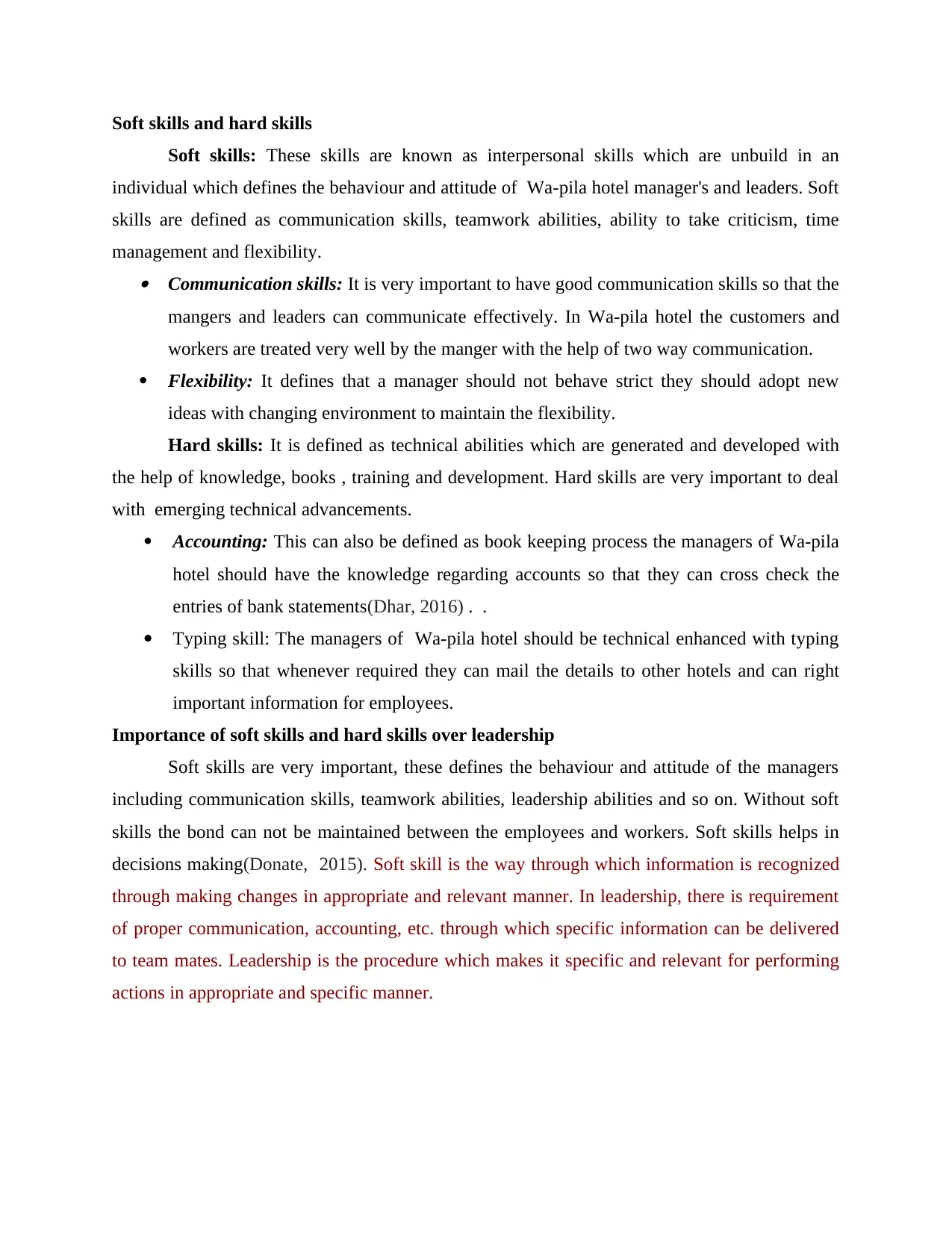
Soft skills and hard skills
Soft skills: These skills are known as interpersonal skills which are unbuild in an
individual which defines the behaviour and attitude of Wa-pila hotel manager's and leaders. Soft
skills are defined as communication skills, teamwork abilities, ability to take criticism, time
management and flexibility. Communication skills: It is very important to have good communication skills so that the
mangers and leaders can communicate effectively. In Wa-pila hotel the customers and
workers are treated very well by the manger with the help of two way communication.
Flexibility: It defines that a manager should not behave strict they should adopt new
ideas with changing environment to maintain the flexibility.
Hard skills: It is defined as technical abilities which are generated and developed with
the help of knowledge, books , training and development. Hard skills are very important to deal
with emerging technical advancements.
Accounting: This can also be defined as book keeping process the managers of Wa-pila
hotel should have the knowledge regarding accounts so that they can cross check the
entries of bank statements(Dhar, 2016) . .
Typing skill: The managers of Wa-pila hotel should be technical enhanced with typing
skills so that whenever required they can mail the details to other hotels and can right
important information for employees.
Importance of soft skills and hard skills over leadership
Soft skills are very important, these defines the behaviour and attitude of the managers
including communication skills, teamwork abilities, leadership abilities and so on. Without soft
skills the bond can not be maintained between the employees and workers. Soft skills helps in
decisions making(Donate, 2015). Soft skill is the way through which information is recognized
through making changes in appropriate and relevant manner. In leadership, there is requirement
of proper communication, accounting, etc. through which specific information can be delivered
to team mates. Leadership is the procedure which makes it specific and relevant for performing
actions in appropriate and specific manner.
Soft skills: These skills are known as interpersonal skills which are unbuild in an
individual which defines the behaviour and attitude of Wa-pila hotel manager's and leaders. Soft
skills are defined as communication skills, teamwork abilities, ability to take criticism, time
management and flexibility. Communication skills: It is very important to have good communication skills so that the
mangers and leaders can communicate effectively. In Wa-pila hotel the customers and
workers are treated very well by the manger with the help of two way communication.
Flexibility: It defines that a manager should not behave strict they should adopt new
ideas with changing environment to maintain the flexibility.
Hard skills: It is defined as technical abilities which are generated and developed with
the help of knowledge, books , training and development. Hard skills are very important to deal
with emerging technical advancements.
Accounting: This can also be defined as book keeping process the managers of Wa-pila
hotel should have the knowledge regarding accounts so that they can cross check the
entries of bank statements(Dhar, 2016) . .
Typing skill: The managers of Wa-pila hotel should be technical enhanced with typing
skills so that whenever required they can mail the details to other hotels and can right
important information for employees.
Importance of soft skills and hard skills over leadership
Soft skills are very important, these defines the behaviour and attitude of the managers
including communication skills, teamwork abilities, leadership abilities and so on. Without soft
skills the bond can not be maintained between the employees and workers. Soft skills helps in
decisions making(Donate, 2015). Soft skill is the way through which information is recognized
through making changes in appropriate and relevant manner. In leadership, there is requirement
of proper communication, accounting, etc. through which specific information can be delivered
to team mates. Leadership is the procedure which makes it specific and relevant for performing
actions in appropriate and specific manner.
Paraphrase This Document
Need a fresh take? Get an instant paraphrase of this document with our AI Paraphraser
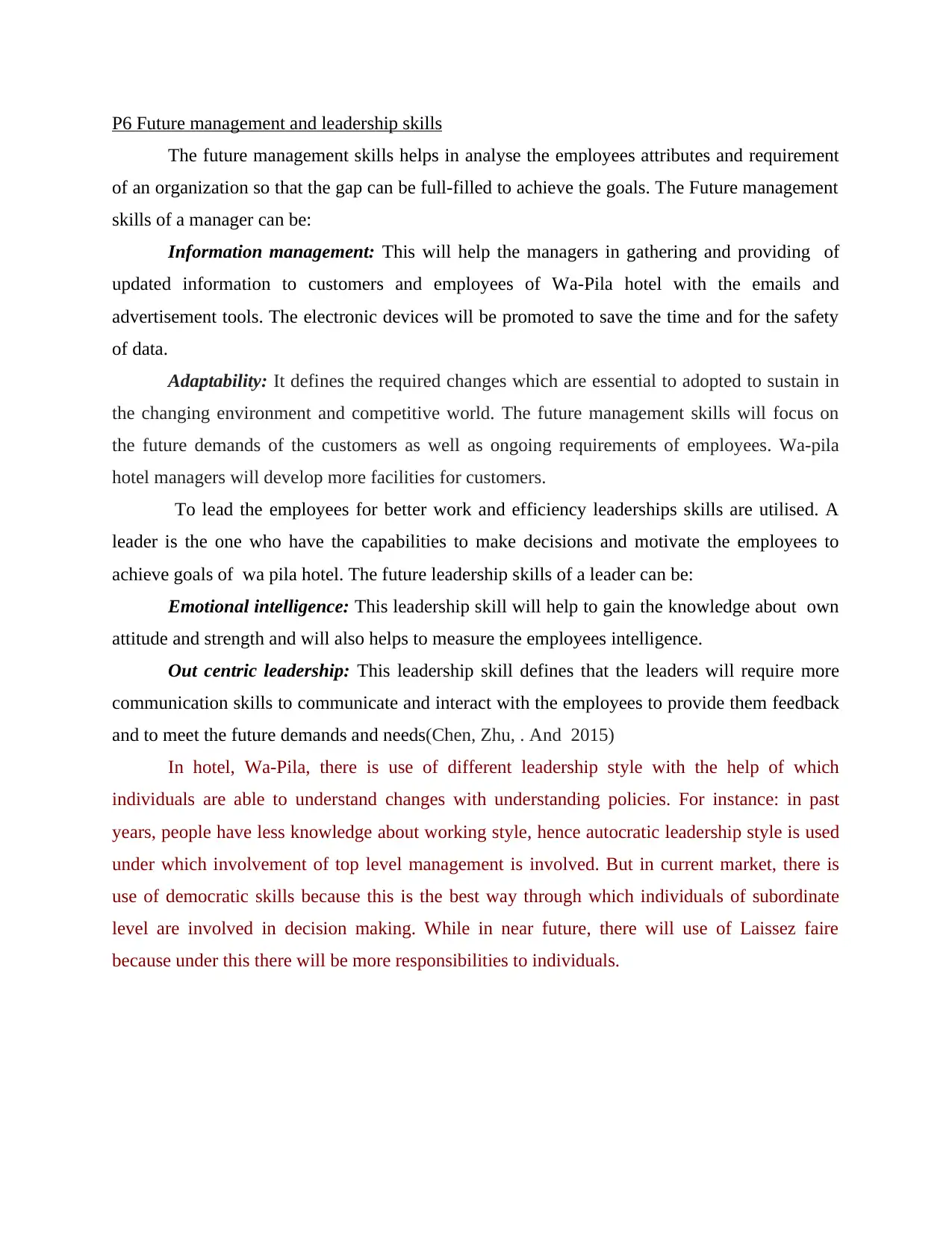
P6 Future management and leadership skills
The future management skills helps in analyse the employees attributes and requirement
of an organization so that the gap can be full-filled to achieve the goals. The Future management
skills of a manager can be:
Information management: This will help the managers in gathering and providing of
updated information to customers and employees of Wa-Pila hotel with the emails and
advertisement tools. The electronic devices will be promoted to save the time and for the safety
of data.
Adaptability: It defines the required changes which are essential to adopted to sustain in
the changing environment and competitive world. The future management skills will focus on
the future demands of the customers as well as ongoing requirements of employees. Wa-pila
hotel managers will develop more facilities for customers.
To lead the employees for better work and efficiency leaderships skills are utilised. A
leader is the one who have the capabilities to make decisions and motivate the employees to
achieve goals of wa pila hotel. The future leadership skills of a leader can be:
Emotional intelligence: This leadership skill will help to gain the knowledge about own
attitude and strength and will also helps to measure the employees intelligence.
Out centric leadership: This leadership skill defines that the leaders will require more
communication skills to communicate and interact with the employees to provide them feedback
and to meet the future demands and needs(Chen, Zhu, . And 2015)
In hotel, Wa-Pila, there is use of different leadership style with the help of which
individuals are able to understand changes with understanding policies. For instance: in past
years, people have less knowledge about working style, hence autocratic leadership style is used
under which involvement of top level management is involved. But in current market, there is
use of democratic skills because this is the best way through which individuals of subordinate
level are involved in decision making. While in near future, there will use of Laissez faire
because under this there will be more responsibilities to individuals.
The future management skills helps in analyse the employees attributes and requirement
of an organization so that the gap can be full-filled to achieve the goals. The Future management
skills of a manager can be:
Information management: This will help the managers in gathering and providing of
updated information to customers and employees of Wa-Pila hotel with the emails and
advertisement tools. The electronic devices will be promoted to save the time and for the safety
of data.
Adaptability: It defines the required changes which are essential to adopted to sustain in
the changing environment and competitive world. The future management skills will focus on
the future demands of the customers as well as ongoing requirements of employees. Wa-pila
hotel managers will develop more facilities for customers.
To lead the employees for better work and efficiency leaderships skills are utilised. A
leader is the one who have the capabilities to make decisions and motivate the employees to
achieve goals of wa pila hotel. The future leadership skills of a leader can be:
Emotional intelligence: This leadership skill will help to gain the knowledge about own
attitude and strength and will also helps to measure the employees intelligence.
Out centric leadership: This leadership skill defines that the leaders will require more
communication skills to communicate and interact with the employees to provide them feedback
and to meet the future demands and needs(Chen, Zhu, . And 2015)
In hotel, Wa-Pila, there is use of different leadership style with the help of which
individuals are able to understand changes with understanding policies. For instance: in past
years, people have less knowledge about working style, hence autocratic leadership style is used
under which involvement of top level management is involved. But in current market, there is
use of democratic skills because this is the best way through which individuals of subordinate
level are involved in decision making. While in near future, there will use of Laissez faire
because under this there will be more responsibilities to individuals.
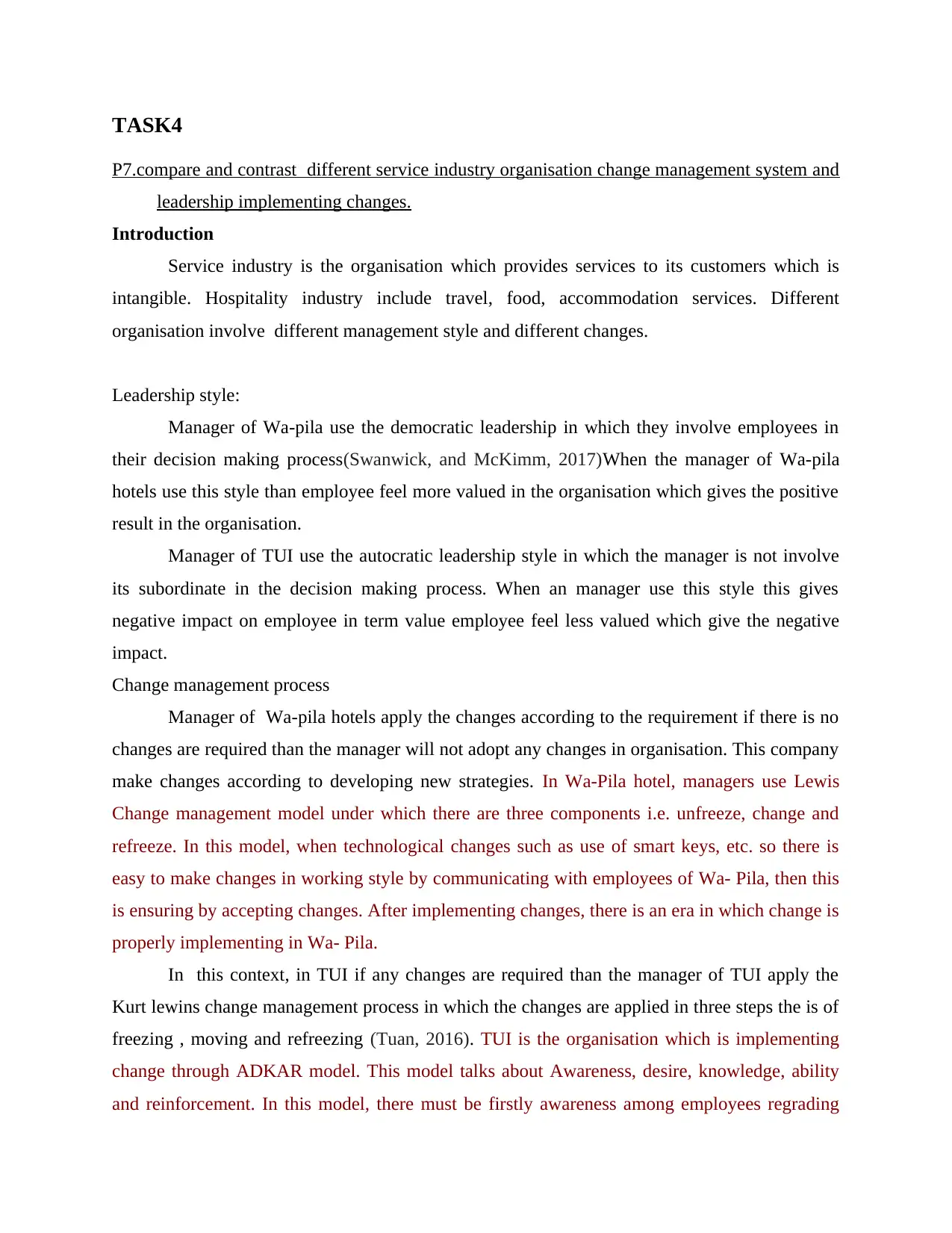
TASK4
P7.compare and contrast different service industry organisation change management system and
leadership implementing changes.
Introduction
Service industry is the organisation which provides services to its customers which is
intangible. Hospitality industry include travel, food, accommodation services. Different
organisation involve different management style and different changes.
Leadership style:
Manager of Wa-pila use the democratic leadership in which they involve employees in
their decision making process(Swanwick, and McKimm, 2017)When the manager of Wa-pila
hotels use this style than employee feel more valued in the organisation which gives the positive
result in the organisation.
Manager of TUI use the autocratic leadership style in which the manager is not involve
its subordinate in the decision making process. When an manager use this style this gives
negative impact on employee in term value employee feel less valued which give the negative
impact.
Change management process
Manager of Wa-pila hotels apply the changes according to the requirement if there is no
changes are required than the manager will not adopt any changes in organisation. This company
make changes according to developing new strategies. In Wa-Pila hotel, managers use Lewis
Change management model under which there are three components i.e. unfreeze, change and
refreeze. In this model, when technological changes such as use of smart keys, etc. so there is
easy to make changes in working style by communicating with employees of Wa- Pila, then this
is ensuring by accepting changes. After implementing changes, there is an era in which change is
properly implementing in Wa- Pila.
In this context, in TUI if any changes are required than the manager of TUI apply the
Kurt lewins change management process in which the changes are applied in three steps the is of
freezing , moving and refreezing (Tuan, 2016). TUI is the organisation which is implementing
change through ADKAR model. This model talks about Awareness, desire, knowledge, ability
and reinforcement. In this model, there must be firstly awareness among employees regrading
P7.compare and contrast different service industry organisation change management system and
leadership implementing changes.
Introduction
Service industry is the organisation which provides services to its customers which is
intangible. Hospitality industry include travel, food, accommodation services. Different
organisation involve different management style and different changes.
Leadership style:
Manager of Wa-pila use the democratic leadership in which they involve employees in
their decision making process(Swanwick, and McKimm, 2017)When the manager of Wa-pila
hotels use this style than employee feel more valued in the organisation which gives the positive
result in the organisation.
Manager of TUI use the autocratic leadership style in which the manager is not involve
its subordinate in the decision making process. When an manager use this style this gives
negative impact on employee in term value employee feel less valued which give the negative
impact.
Change management process
Manager of Wa-pila hotels apply the changes according to the requirement if there is no
changes are required than the manager will not adopt any changes in organisation. This company
make changes according to developing new strategies. In Wa-Pila hotel, managers use Lewis
Change management model under which there are three components i.e. unfreeze, change and
refreeze. In this model, when technological changes such as use of smart keys, etc. so there is
easy to make changes in working style by communicating with employees of Wa- Pila, then this
is ensuring by accepting changes. After implementing changes, there is an era in which change is
properly implementing in Wa- Pila.
In this context, in TUI if any changes are required than the manager of TUI apply the
Kurt lewins change management process in which the changes are applied in three steps the is of
freezing , moving and refreezing (Tuan, 2016). TUI is the organisation which is implementing
change through ADKAR model. This model talks about Awareness, desire, knowledge, ability
and reinforcement. In this model, there must be firstly awareness among employees regrading
⊘ This is a preview!⊘
Do you want full access?
Subscribe today to unlock all pages.

Trusted by 1+ million students worldwide
1 out of 15
Related Documents
Your All-in-One AI-Powered Toolkit for Academic Success.
+13062052269
info@desklib.com
Available 24*7 on WhatsApp / Email
![[object Object]](/_next/static/media/star-bottom.7253800d.svg)
Unlock your academic potential
Copyright © 2020–2026 A2Z Services. All Rights Reserved. Developed and managed by ZUCOL.





